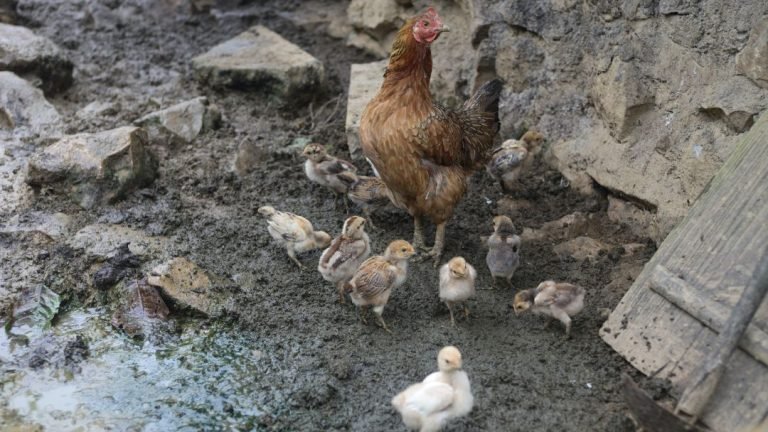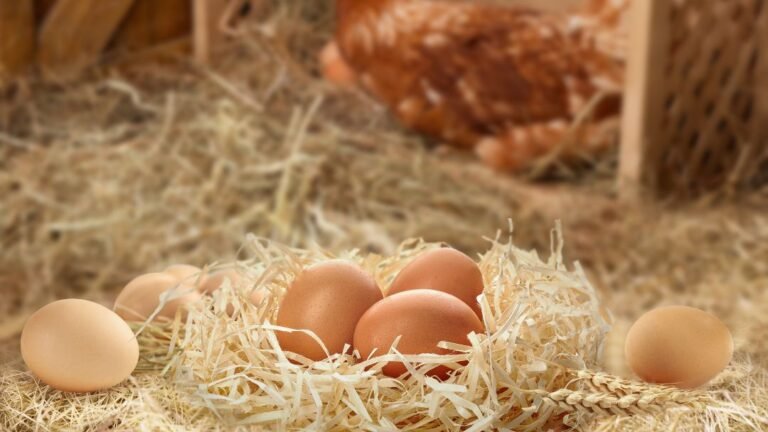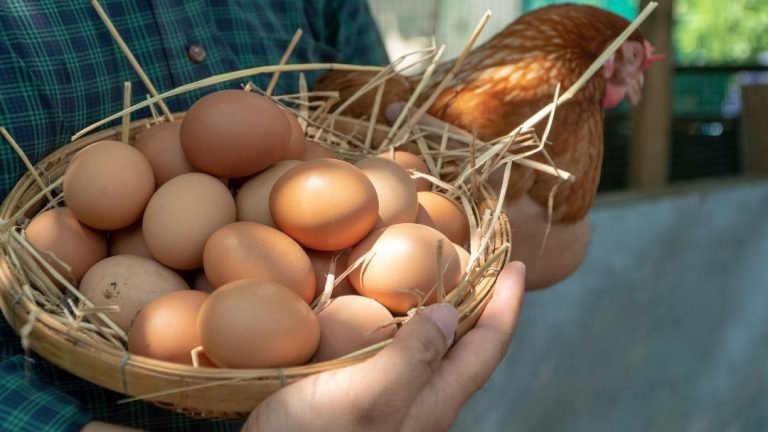Chickens start laying eggs at around 4-6 months of age. During this time, they undergo various physical changes that allow them to begin egg production.
Although the exact timing can vary depending on the breed and individual chicken, it is generally safe to expect your chickens to start laying eggs within this age range. Understanding when chickens start laying is important for poultry enthusiasts and farmers as it helps them plan their flock management and egg production.
We will explore the factors and signs to look out for when determining if your chickens are ready to lay eggs. We will also provide tips on how to support and encourage healthy egg production in your flock. So, let’s crack the code and unravel the mystery of when chickens start laying!
Factors Affecting The Age Of Chickens To Start Laying
When it comes to raising backyard chickens, one of the most exciting milestones is when they start laying eggs. But have you ever wondered when this will happen? The age at which chickens start laying can vary depending on several factors. In this blog post, we will crack the code and explore the various factors that affect the age of chickens to start laying. Let’s dive in!Genetic Factors
Genetics play a crucial role in determining the age at which chickens will start laying. Different chicken breeds have their own characteristics and traits, including egg production. Some breeds are known for their early maturity and may start laying as early as 4 to 5 months old, while others may take 6 to 8 months or even longer.It’s important to understand the genetic predisposition of your chicken breed when it comes to egg-laying. Consult breeders, poultry experts, or reference materials to get an idea of the average age range for your specific breed. This will help manage your expectations and prepare accordingly for when your chickens will start contributing to your breakfast table.Nutrition And Feeding
Proper nutrition is vital for the healthy development of chickens and their ability to lay eggs. A well-balanced diet ensures that chickens get all the necessary nutrients, such as protein, vitamins, and minerals, which are essential for egg production.When it comes to nutrition, protein is the key player. A diet rich in protein promotes healthy growth and reproductive development in chickens. You can provide a high-quality layer feed that contains around 16% to 18% protein to ensure your chickens have the necessary building blocks for egg production.In addition to proper nutrition, feeding practices also matter. Ensure that your chickens have access to fresh water at all times and feed them at regular intervals. Avoid overfeeding or underfeeding, as both can negatively impact egg-laying. Monitoring their feed consumption and adjusting the quantity accordingly can help maintain optimal condition for laying.Environmental Factors
The environment in which chickens are raised can significantly influence the age at which they start laying. Environmental factors such as temperature, lighting, and stress levels play a role in triggering the onset of egg-laying.Temperature: Chickens prefer a moderate temperature range of around 10°C to 24°C (50°F to 75°F). Extreme temperatures, whether too hot or too cold, can delay the start of egg-laying. Ensure that their coop is properly insulated to provide a comfortable temperature throughout the year.Lighting: Chickens require a certain amount of daylight to stimulate egg production. In nature, they rely on the changing seasons to regulate their reproductive cycles. In a controlled environment, such as a backyard coop, artificial lighting can be used to supplement the natural daylight. Providing 14-16 hours of light per day using a timer can help encourage earlier egg production.Stress Levels: Chickens are sensitive creatures, and stress can delay their egg-laying. Loud noises, overcrowding, predator threats, and sudden changes in their environment can all contribute to increased stress levels. Ensure that your chickens have enough space, a calm environment, and proper socialization to minimize stress and promote healthy egg-laying.In conclusion, the age at which chickens start laying can be influenced by various factors, including genetics, nutrition and feeding, and environmental conditions. By understanding these factors and providing the right conditions, you can help your chickens start laying eggs at the optimal age. Remember to consult breed-specific information, provide a nutritious diet, and create a comfortable and stress-free environment for your feathered friends. Happy egg-laying!Signs That Chickens Are Ready To Lay Eggs
As a chicken owner, understanding the signs that indicate when your chickens are ready to start laying eggs is crucial. Knowing what to look for can help you ensure optimal care and support the productive egg-laying cycle of your flock. This guide will highlight the physical changes and development as well as the behavioral cues that signal a chicken’s readiness to lay eggs.
Physical Changes And Development
When chickens are approaching the laying age, their bodies undergo various physical changes and development. These changes occur as the reproductive system matures and prepares to produce eggs. Here are some key indicators to watch out for:
- Reddened Comb and Wattles: One of the first noticeable changes is the reddening of the comb and wattles. As the hormones in the hen’s body increase, these areas will become more vibrant in color, indicating sexual maturity.
- Pelvic Widening: A reliable physical sign that a chicken is becoming ready to lay is pelvic widening. If you gently feel the pelvic bones on either side of the vent, you will notice that the gap between them begins to widen as the bird matures.
- Blossoming Vent: A hen’s vent, or egg-laying opening, will appear moist, plump, and slightly swollen when she is nearing the point of laying her first egg. This puffiness is a result of the egg being pushed down the oviduct system, preparing for its imminent arrival.
These key physical changes are visible indicators that your chickens are progressing towards the egg-laying phase. Regularly monitoring these signs will allow you to anticipate when your hens will start producing eggs.
Behavioral Cues
Alongside the physical changes, chickens also exhibit behavioral cues that indicate their readiness to lay eggs. By observing their behavior closely, you can gain valuable insights into their egg-laying stage. Here are some behavioral cues to watch out for:
- Nesting Behavior: Hens that are getting ready to lay eggs will often start exhibiting nesting behavior. They may become more interested in secluded areas, scratching and forming small nests to lay their eggs in.
- Squatting: When you approach a mature hen, she may squat down on the ground. This behavior is a submissive gesture and signifies that she is ready to be mounted by a rooster for fertilization. Squatting is another indication that she will soon begin laying eggs.
- Increased Vocalization: As hens near the egg-laying stage, they may become more vocal. You may notice them clucking with increased frequency and volume. This vocalization is their way of communicating their readiness to lay eggs and may continue throughout the laying process.
- Exploring the Nest Boxes: If you have provided your chickens with nest boxes, you may observe them frequently exploring and inspecting these areas. They are instinctively searching for a suitable spot to lay their eggs, signaling that egg-laying is imminent.
By being attuned to these behavioral cues, you can anticipate when your chickens will start laying eggs and provide them with the necessary support and facilities.
Chicken Breeds And Average Laying Age
When it comes to raising backyard chickens, one of the most exciting milestones is when your hens start laying eggs. However, it can be a bit tricky to determine exactly when your chickens will begin laying. The age at which chickens start laying eggs varies depending on the breed. Some breeds are known to mature earlier, while others take a little longer.
Identification Of Early And Late-maturing Breeds
If you’re eager to start collecting fresh eggs, it is essential to choose chicken breeds that mature early. These early-maturing breeds typically begin laying between 4 to 5 months of age.
On the other hand, some breeds are considered late-maturing. These breeds take a bit more time before they start laying. Expect to see eggs from late-maturing breeds around 6 to 8 months of age.
Popular Chicken Breeds And Their Laying Age
Now, let’s take a closer look at some popular chicken breeds and their average laying age.
| Chicken Breed | Average Laying Age |
|---|---|
| Rhode Island Red | 4 to 5 months |
| Plymouth Rock | 4 to 5 months |
| Leghorn | 4 to 5 months |
| Sussex | 4 to 5 months |
| Ameraucana | 5 to 6 months |
| Barred Rock | 5 to 6 months |
| Orpington | 6 to 8 months |
| Brahma | 6 to 8 months |
These breeds are just a few examples, and there are many others to choose from. Keep in mind that these are ballpark figures, and individual chickens may vary slightly.
Remember, patience is key when it comes to waiting for your chickens to start laying eggs. While it can be thrilling to envision your hens in full production, it’s essential to allow nature to take its course.
Tips To Encourage Early Egg Production
Introductory Paragraph:
Encouraging early egg production in chickens can be an exciting prospect for poultry enthusiasts. Not only does it mean you can start enjoying the benefits of fresh, homegrown eggs sooner, but it also indicates the health and well-being of your flock. By implementing a few key strategies, you can create an environment that supports the natural egg-laying instincts of your chickens and helps them start laying earlier. In this article, we will explore three essential tips to encourage early egg production: optimal nutrition and feed composition, providing adequate light and temperature, and creating a comfortable nesting area.
Optimal Nutrition And Feed Composition:
Proper nutrition plays a vital role in supporting early egg production in chickens. Feeding your flock a well-balanced diet that meets their specific nutritional requirements is essential. Ensure their feed contains high-quality protein, vitamins, minerals, and essential fatty acids. Incorporating a layer feed specifically formulated for egg-laying chickens can provide the necessary nutrients to support early egg production. Additionally, supplementing their diet with calcium-rich treats such as crushed oyster shell or eggshells can help strengthen their eggshells and promote healthy laying habits.
Providing Adequate Light And Temperature:
Lighting and temperature are critical factors that influence egg production in chickens. Chickens require approximately 14-16 hours of light per day to trigger their egg-laying cycle. Consider using artificial lighting in the coop during winter months when daylight hours are shorter, gradually increasing or decreasing the amount of light to simulate natural seasonal changes. It’s also important to maintain a consistent and comfortable temperature in the coop. Extreme temperature fluctuations can stress chickens and disrupt their egg production. Providing proper insulation and ventilation in the coop helps regulate the temperature and ensures a comfortable environment for your flock.
Creating A Comfortable Nesting Area:
A comfortable and inviting nesting area is essential for encouraging early egg production. Chickens instinctively seek out secluded and private spaces to lay their eggs. Providing clean and cozy nesting boxes with suitable bedding material, such as straw or shavings, encourages chickens to lay their eggs in designated areas. It’s crucial to regularly clean and maintain the nesting boxes to prevent the buildup of dirt, dust, or parasites, which can discourage chickens from using them. Creating a calm and secure environment around the nesting area also helps alleviate any stress or disturbance that may hinder optimal egg production.
Overall, by focusing on optimal nutrition and feed composition, providing adequate light and temperature, and creating a comfortable nesting area, you can encourage early egg production in your flock of chickens. Implementing these tips will not only support their natural instincts but also contribute to the overall well-being and productivity of your feathered friends. Happy egg-laying!Troubleshooting Delayed Laying In Chickens
When it comes to backyard chicken keeping, eagerly awaiting your hens to start laying can be an exciting time. However, sometimes the anticipation can turn into frustration if your chickens are not laying eggs as expected. In this section, we will look at some common factors that may be causing delayed laying in chickens and how to address them. By identifying potential health issues, addressing stress factors, and seeking professional help if necessary, you can crack the code and get your chickens back on track to laying eggs.
Identifying Potential Health Issues
If your chickens are not laying eggs as expected, it’s important to first rule out any potential health problems that may be affecting their egg production. Some common health issues that can cause delayed laying include:
- Moulting: Chickens go through a natural process called moulting where they shed their old feathers and grow new ones. During this time, hens may temporarily stop laying eggs. Moulting typically occurs once a year and can last for several weeks.
- Parasites: External parasites such as mites and lice can cause stress and discomfort to your chickens, leading to a decrease in egg production. Regularly inspect your chickens for signs of parasites and treat them accordingly.
- Dietary deficiencies: A well-balanced diet is essential for optimal egg production. Lack of certain nutrients, such as calcium or protein, can result in delayed laying. Ensure your chickens are receiving a nutritionally balanced feed and consider providing supplemental calcium sources like oyster shells.
Addressing Stress Factors
Stress can greatly impact a chicken’s ability to lay eggs, so it’s important to minimize any potential stressors in their environment. Some common stress factors that can lead to delayed laying include:
- Predator threats: Chickens that feel unsafe or constantly on edge due to predator threats may not lay eggs. Secure your chicken coop and provide adequate fencing and protection to help alleviate their stress.
- Changes in routine: Chickens thrive on routine, so any sudden changes in their environment or daily schedule can disrupt their egg-laying cycle. Try to maintain a consistent routine and minimize disruptions as much as possible.
- Overcrowding: Overcrowding can cause stress and lead to decreased egg production. Ensure your chickens have enough space in the coop and outdoor areas to roam comfortably.
Seeking Professional Help
In some cases, if you have addressed potential health issues and stress factors but your chickens are still not laying eggs, it may be necessary to seek professional help. A veterinarian or poultry expert can help identify any underlying issues and provide appropriate treatment or advice. They may conduct fecal tests or examine your chickens to determine the cause of the delayed laying.
Remember, patience is key when troubleshooting delayed laying in chickens. By identifying and addressing potential health issues, minimizing stress factors, and seeking professional help if necessary, you can empower your chickens to start laying eggs and enjoy the bountiful rewards of backyard chicken keeping.
Conclusion
To summarize, understanding when chickens start laying eggs can be a fascinating process. By considering factors like breed, age, and environment, you can determine the approximate timeline. Remember, patience is key, as chickens have their own unique development patterns. Providing a balanced diet, proper care, and a comfortable coop will ensure healthy and timely egg production.
By cracking the code and empowering yourself with knowledge, you can enjoy the rewards of fresh, homegrown eggs.



